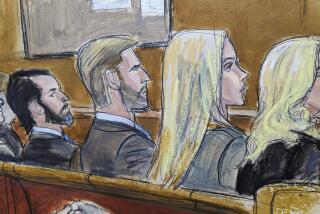Future Presidents Could Feel the Sting of Paula Jones Case
WASHINGTON â If the never-ending tension between the presidency and the Congress is seen as a seesaw, the presidential end of the tottering board took on a new weight this week. And it wasnât doing too well to begin with.
Beyond the immediate distractions and political pitfalls the Supreme Court laid in Bill Clintonâs path with its Tuesday decision that allows Paula Corbin Jonesâ sexual-harassment suit against him to proceed, it has created the potential for even greater challenges for future presidents.
These future occupants of the White House could face a growing number of lawsuits in this increasingly litigious society, say constitutional scholars and historians. Perhaps most important, they say, in opening a sitting president to the demands of private lawsuits, the ruling continues the steady denigration of the institution of the presidency.
The decision comes at a time when many believe the presidency has not yet recovered from the blows that occurred a generation ago--the credibility gap created by Lyndon B. Johnsonâs prosecution of the Vietnam War and the stain of Watergate, which brought Richard Nixonâs downfall.
In a sign of the erosion of the presidencyâs aura--sturdy until mid-century but lace-like now, within hours of the court decision, âTonight Showâ host Jay Leno found a link between Nixonâs resignation and Clintonâs problems. Consider the similarities between the two presidents, he suggested: âBoth got in trouble in hotels . . . â
Like the Watergate scandal and misleading government accounts of the Vietnam War, the further airing of Jonesâ allegation that Clinton--then the governor of Arkansas--propositioned her in a Little Rock hotel in 1991 âraises questions about the incumbentâs moral character,â said historian Robert Dallek. But more than that, he added, âwhat itâs bound to do is undercut the presidentâs credibility and have echoes for the institution of the presidency for the foreseeable future.â
The presidency, of course, has withstood serious hits in the past--not the least of which have been delivered by the questionable abilities and actions of some of the incumbents.
But the office itself once was revered. Now, many people no longer consider it a suitable job for their children.
A poll conducted last autumn by Princeton Survey Research found that by a 2-1 ratio, parents wouldnât want their children to become president. What career choices ranked higher? Professor, doctor, minister, carpenter, professional athlete. (It did, however, rank above that of movie star.)
Some scholars believe that taken from a narrow constitutional perspective, the courtâs ruling may have little long-range impact.
âWhat the court dealt with is not official action by the president, and the chance that somebody who is going to be president, or is president, getting involved in some serious legal problem that is not officially related [to the job] is pretty slim,â said Mark Tushnet, a professor at the Georgetown University School of Law.
Indeed, said Peter Wallison, a White House counsel during the Reagan administration, âmost of us go through life without being a defendant in a civil lawsuit. Thereâs no reason why presidents canât.â
But for Lloyd Gardner, a professor of American history at Rutgers University in New Jersey, the decision carries with it âincredibly broad ramifications.â
Along with further weakening the appeal of the office, he said, it may well open those who seek it to harassing lawsuits, or to suits that might not otherwise have been filed were it not for the potential defendantâs celebrity.
Even more important and longer lasting, with much of a presidentâs power derived from the officeâs ability to command respect--and turn that respect into persuasion and public support--âit weakens the president in the eyes of the Congress and makes him more vulnerable to pressures from Capitol Hill,â Gardner said. âThis system posits a tension between the two; this lifts the congressional side.â
And that, Gardner added, âis very worrisome.â
More to Read
Get the L.A. Times Politics newsletter
Deeply reported insights into legislation, politics and policy from Sacramento, Washington and beyond. In your inbox three times per week.
You may occasionally receive promotional content from the Los Angeles Times.










